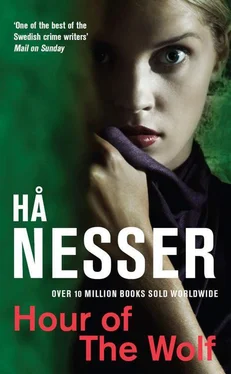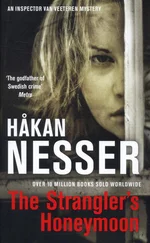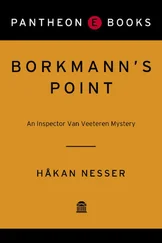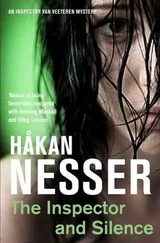Hakan Nesser - Hour of the wolf
Здесь есть возможность читать онлайн «Hakan Nesser - Hour of the wolf» весь текст электронной книги совершенно бесплатно (целиком полную версию без сокращений). В некоторых случаях можно слушать аудио, скачать через торрент в формате fb2 и присутствует краткое содержание. Жанр: Полицейский детектив, на английском языке. Описание произведения, (предисловие) а так же отзывы посетителей доступны на портале библиотеки ЛибКат.
- Название:Hour of the wolf
- Автор:
- Жанр:
- Год:неизвестен
- ISBN:нет данных
- Рейтинг книги:5 / 5. Голосов: 1
-
Избранное:Добавить в избранное
- Отзывы:
-
Ваша оценка:
- 100
- 1
- 2
- 3
- 4
- 5
Hour of the wolf: краткое содержание, описание и аннотация
Предлагаем к чтению аннотацию, описание, краткое содержание или предисловие (зависит от того, что написал сам автор книги «Hour of the wolf»). Если вы не нашли необходимую информацию о книге — напишите в комментариях, мы постараемся отыскать её.
Hour of the wolf — читать онлайн бесплатно полную книгу (весь текст) целиком
Ниже представлен текст книги, разбитый по страницам. Система сохранения места последней прочитанной страницы, позволяет с удобством читать онлайн бесплатно книгу «Hour of the wolf», без необходимости каждый раз заново искать на чём Вы остановились. Поставьте закладку, и сможете в любой момент перейти на страницу, на которой закончили чтение.
Интервал:
Закладка:
He went back to the bedroom and got dressed. As he did so, Ulrike moved restlessly in the bed but she didn’t wake up. He stole out into the hall, closing the door behind him. Put on his shoes, a scarf and an overcoat. Left the flat and tiptoed down the stairs and out into the street.
Light rain was falling — or rather, drifting around to form a soft curtain of floating, feathery drops. The temperature must have been seven or eight degrees above freezing. No wind to speak of either, and the streets deserted — as if a long-awaited bomb attack were now imminent. Dark and self-absorbed, caught up in the all-embracing sleep of the surrounding buildings.
Erich is dead, he thought, and started walking.
He returned an hour and a half later. Ulrike was sitting in the murky kitchen, waiting for him with her hands wrapped round a cup of tea. He could sense an aura of reproachful worry and sympathy, but it affected him no more than a wrong number or a formal condolence.
I hope she can cope, he thought. I hope I don’t drag her down with me.
‘You’re wet,’ she said. ‘Did you go far?’
He shrugged and sat down opposite her.
‘I walked out towards Lohr and back,’ he said. ‘It’s not raining all that hard.’
‘I fell asleep,’ she said. ‘I’m sorry.’
‘I needed to get out.’
She nodded. Half a minute passed: then she stretched her hands out over the table. Left them lying half-open a few centimetres in front of him, and after a while he took hold of them. Wrapped his own hands round them and squeezed them tentatively. He realized that she was waiting for something. That he needed to say something.
‘There was an old couple when I was a little boy,’ he began. ‘They were called Bloeme.’
She nodded vaguely and looked enquiringly at him. He contemplated her face for a while before continuing.
‘Maybe they weren’t that old in fact, but they gave the impression of being the oldest people in the whole world. They lived in the same block as we did, just a few houses away from ours, and they hardly ever went out. You only ever saw them very occasionally on a Sunday afternoon… And when they appeared all games and all signs of life in the street came to a standstill. They always walked arm in arm on the shady side of the street, the husband always wore a hat, and there was an aura of deep sorrow around them. A cloud. My mother told me their story — I was no more than seven or eight, I should think. The Bloemes used to have two daughters, two pretty young daughters who travelled to Paris together one summer. They were both murdered under a bridge, and ever since, their parents stopped associating with other people. The girls came back home, each of them in a French coffin. Anyway, that was the story… We children always regarded them with the greatest possible deference. A hell of a lot of respect, in fact.’
He fell silent and let go of Ulrike’s hands.
‘Children shouldn’t die before their parents.’
She nodded.
‘Would you like a cup of tea?’
‘Yes please. If you add a drop or two of rum.’
She stood up. Went over to the work surface and switched on the electric kettle. Searched round among the bottles in the cupboard. Van Veeteren remained seated at the table. Clasped his hands and rested his chin on his knuckles. Closed his eyes and once again felt his eyes throbbing in their sockets. A burning sensation inside them and up into his temples.
‘I’ve experienced it before.’
Ulrike turned to look at him.
‘No, I don’t mean at work. It’s just that I’ve imagined Erich’s death many times… That it would be me who had to bury him instead of vice versa. Not lately, but a few years back. Eight or ten years ago. Imagined it pretty tangibly… The father burying his son — I don’t know, perhaps it’s something all parents do.’
She put two steaming hot cups down on the table, and sat down opposite him again.
‘I didn’t,’ she said. ‘Not in detail like that, at least. Why did you torture yourself with that sort of thing? There must have been reasons.’
Van Veeteren nodded, and took a cautious sip of the strong, sweet tea.
‘Oh yes.’ He hesitated a moment. ‘Yes, there were reasons all right. One at least… When Erich was eighteen he tried to commit suicide. Swallowed enough tablets to have accounted for five or six fully grown people. A girlfriend found him and rushed him to hospital. But for her he would have died. That’s over ten years ago now. I dreamt about it every single night for quite a while. Not just that vacant, desperate, guilt-laden expression on his face as he lay in bed at Gemejnte… I dreamt that he had succeeded in taking his own life, that I was putting flowers on his grave. And so on. It feels as if… as if I was practising for what’s happened. It’s reality now, and during those years I knew that it would be, one of these days. Or thought so, at least. I had almost managed to forget it, but we’re there now. Erich is dead.’
He fell silent again. The newspaper boy or some neighbour or other passed by on the landing outside. Ulrike made as if to say something, but changed her mind.
‘I tried to get into Keymerkyrkan while I was out walking,’ Van Veeteren continued, ‘but it was locked. Can you tell me why we need to keep our churches locked up?’
She stroked his hands gently. A minute passed. Two minutes. She was sitting there digesting his words, he realized that.
‘Erich didn’t die because he wanted to die,’ she said eventually. ‘That’s an important difference.’
He didn’t answer. Let go of her with his right hand and took a sip of tea.
‘Perhaps,’ he said. ‘Perhaps that does make an important difference. I find it hard to decide that just now.’
Then silence again. The grey light of dawn had begun to creep in through the window. It was a few minutes past seven. The street and the town had woken up. To yet another November day. Life was about to start moving again.
‘I don’t have the strength to talk about it any more,’ said Van Veeteren. ‘I can’t see the point of wrapping it up in a mass of words. Forgive me if I say nothing. I’m very grateful that you are here. Eternally grateful.’
‘I know,’ said Ulrike Fremdli. ‘No, it’s not about words. It’s not about you and me at all. Shall we go back to bed for a while?’
‘I wish it was me instead.’
‘It’s futile, thinking like that.’
‘I know. Futility is the playing field of desire.’
He emptied his cup and followed her into the bedroom.
Renate rang at lunchtime: his ex-wife, the mother of his dead son. The call lasted twenty minutes: sometimes she was speaking, sometimes crying. When he replaced the receiver, he thought about what Ulrike had said.
It’s not about you and me at all.
He decided he would try to bear that comment in mind. Ulrike had lost her husband in circumstances reminiscent of these: that was three years ago, and that was how they had first met. Van Veeteren and Ulrike Fremdli. There was a lot to suggest that she knew what she was talking about.
In so far as it was possible to know. At two o’clock he got into his car and drove out to Maardam’s airport to collect Jess. She was overcome by despair even as she walked towards him in the arrivals hall: they fell into each other’s arms and remained standing in the middle of the floor like that — for what seemed hours. Just stood there, in the midst of the usual hustle and bustle that was the norm at Sechshafen, swaying back and forth in wordless, timeless, mutual sorrow.
He and his daughter Jess. Jess with the seven-year-old twins and a husband in Rouen. Erich’s sister. His only remaining child.
‘I don’t want to meet Mum yet,’ she admitted when they came to the car park. ‘Can we just drive somewhere and sit down for a bit?’
Читать дальшеИнтервал:
Закладка:
Похожие книги на «Hour of the wolf»
Представляем Вашему вниманию похожие книги на «Hour of the wolf» списком для выбора. Мы отобрали схожую по названию и смыслу литературу в надежде предоставить читателям больше вариантов отыскать новые, интересные, ещё непрочитанные произведения.
Обсуждение, отзывы о книге «Hour of the wolf» и просто собственные мнения читателей. Оставьте ваши комментарии, напишите, что Вы думаете о произведении, его смысле или главных героях. Укажите что конкретно понравилось, а что нет, и почему Вы так считаете.












